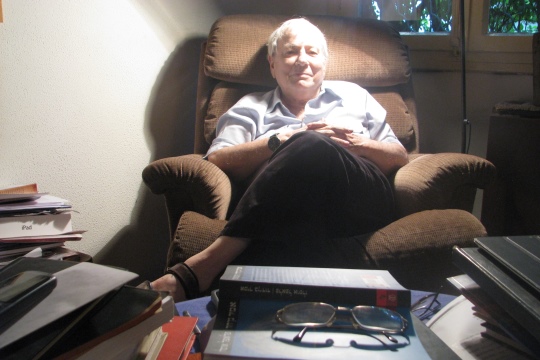“I know that a Jewish state can only be a dream,” Yoram Kaniuk once told me, “but I want to have my dream.” This literary giant and eternal dreamer passed away last night (Saturday) at the age of 83, and an important critical and humanist voice fell silent in this land.
The dream of Israel is one for which Tel Aviv-born Kaniuk nearly gave his life at the age of 17. He lied about his age in order to join the Palmach Brigades and was shot in the leg on the slopes of Jerusalem’s Mount Zion. Six decades later, having finally reached his renown as one of Hebrew literature’s most powerful voices, he told the tale of that war. His book, 1948, is not only a stray from the typical Zionist narrative, it is honest, irreverent and eye opening.
Kaniuk was a quintessential Israeli “sabra.” He was certainly a Zionist, in that he felt the Jewish nation would have no future without a home. Still, he was concerned for the wellbeing of every soul on this soil and frowned at the Israeli Right’s abduction of Zionism. His understanding of the term was miles apart from that which is common in contemporary Israel. “Our Zionism was on the coast,” he told me in another conversation. “When we dreamed of a state here, Jerusalem was not meant to be a part of it, never mind the West Bank and Gaza.”
The Kaniukian middle way may seem contrived to some, but in today’s Israel it is revolutionary. Kaniuk rejected the world view of Messianic religious Zionism, which combines Zionism as an existential solution — a life-saving project — with biblical context and extreme nationalism, a mix that permits inequality and atrocities. He was active in the struggle to secure the right of return for the refugees of Iqrit and Bir’im and cooperated with Palestinian intellectuals long before it was considered “acceptable” behavior. His disdain for mixing synagogue and state played out most powerfully in 2012, when he successfully appealed to remove “Jewish” from the “religion” clause in his Israeli ID card. To this day, he is the only Israeli to have achieved that feat.
He who molds reality with his own hands knows it can be formed into anything. Kaniuk’s reading of Jewish history — and particularly of the Holocaust — convinced him that the Jewish people have a role as a light unto the nations when it comes to human rights and social responsibility. He also knew Israel was not an ideal setting for fulfilling that role. In his iconic novel, Adam Resurrected, published as early as 1963, Kaniuk painted an eerie metaphor for Israel: an ultra-modern lunatic asylum, set in the middle of the desert and in which the patients are all Holocaust survivors.
The asylum was founded by Rebecca Siezling, an affluent American Jew. Siezling arrives in Israel in the early sixties with a sense of spiritual loss. Via a chance encounter with a local spiritualist, she learns that what she misses is God, that God speaks to lunatics and that he does so in the desert. The country, Mrs. Siezling learns, has no shortage of lunatics. Forearms tattooed with blue numbers are plenty and everyone around suffers from some form of PTSD. It has no lack of desert, either. In the heart of that desert, near the town of Arad, Mrs. Siezling’s Institute for Rehabilitation and therapy is thus created.
Like every Kaniuk novel, Adam Resurrected is a human story. Adam Stein, its protagonist, is so deeply scarred by his Holocaust experience that his ability to channel God is greatly impaired; instead, he channels man, ultimately healing himself by helping another heal. His character is the very quintessence of complex, believable humanity. This is Israel as Kaniuk envisioned it.
But Israel itself keeps chasing God and turning its back on man. In love with the nation for which he fought, Kaniuk kept hoping to reconcile the difference between reality and potential. In his later years he abandoned the Left, with which he was plenty active over the years; he hoped that a centrist approach might prove pragmatic. Then he turned back left — stubbornly. Going back to read his own contributions for +972 and my previous mentions of him on this site, I found the following attack he voiced against moderate elements within the #J14 movement.
“They weaken the revolution,” Kaniuk said in September 2011. “This leadership should have openly called for Netanyahu to quit. I want them to say ‘elections now.’ Say it! That would startle Netanyahu. Why not startle him? Netanyahu keeps leading us to Masada. He fights with the Turks, fights with the Americans, fights with everybody. What they express is too mellow. What do they mean when they chant: ‘The people demand social justice?’ What the people demand is a regime change!”
A true revolutionary speaks of revolution also at the age of 81. Kaniuk revolutionized this land in many ways — through war, literature, op-eds and activism. He knew that this country deserves at least one more revolution but was too old to bring it about. We will pick up his books, his train of thought, his faith in the young and keep trying.


